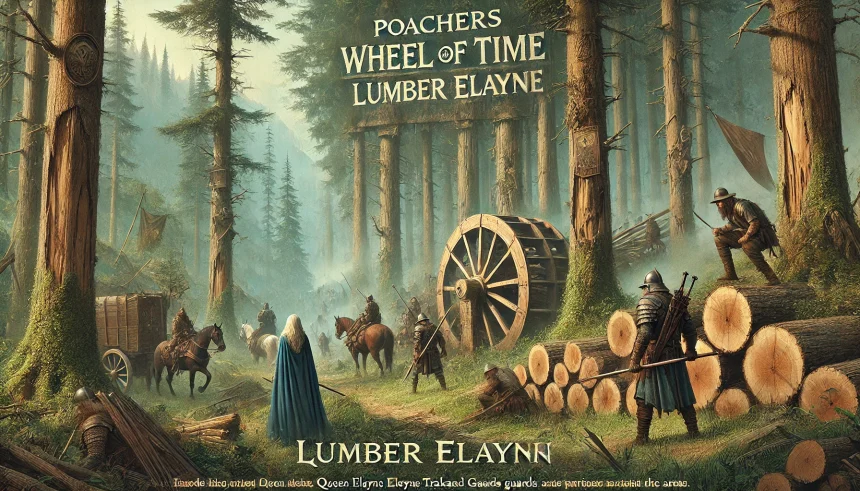In Robert Jordan’s epic fantasy series The Wheel of Time, numerous elements shape the intricate world and its politics. Among these, Poachers Wheel of Time Lumber Elayne stands out as a key theme, highlighting the balance of power, resource control, and law enforcement.
Poaching, timber trade, and Queen Elayne Trakand’s leadership are deeply interconnected, reflecting the significance of natural resources, governance, and political influence in shaping nations and conflicts. In this article, we will explore the roles and significance of these elements, showing how each plays a part in the larger story of The Wheel of Time.
Poachers in The Wheel of Time
What are Poachers?
Poachers are individuals who illegally hunt, fish, or harvest resources, typically in areas that are restricted or protected by local rulers or laws. In the world of The Wheel of Time, poaching is not just a simple crime; it is an act that can impact the economy, environment, and social stability. Poaching can take many forms, such as:
- Hunting game without the necessary permissions or licenses.
- Harvesting valuable plants, animals, or minerals, often for trade or personal gain.
- Smuggling goods, such as rare herbs, timber, or animal pelts, often crossing borders illegally.
In many regions of the world, poaching is treated as a serious crime because it can deplete valuable resources that are essential for the economy or for the nation’s defenses.
The Role of Poachers Across Different Nations
The different nations in The Wheel of Time each have their own approach to law enforcement, especially when it comes to protecting their resources from poachers.
- Andor, ruled by Elayne Trakand, is a nation with vast forests and resources. Poaching in Andor is heavily regulated due to the importance of its forests for timber, construction, and trade. The penalties for poaching are strict, as the kingdom relies on its forests for economic stability and military defense.
- In the Two Rivers, there is less central control, and while hunting is common and sometimes necessary for survival, poaching on a large scale is frowned upon. The local inhabitants are more focused on personal survival, though illegal hunting for profit could still attract trouble from outside authorities.
- The Borderlands are areas frequently affected by war and the threats of the Shadowspawn. Poaching in these regions is often more about survival, and the harsh conditions may lead to a more lenient view on hunting. However, even here, there is still an awareness that resources must be managed wisely for the good of the people.
Poaching and Law Enforcement
Local authorities, such as wardens, militias, and guards, are responsible for stopping poaching and regulating the use of natural resources. In places where poaching is common, the government or nobility often imposes laws to protect the resources. In the case of Andor, Elayne and her family would have a vested interest in maintaining order and preventing illegal activities that could harm the kingdom’s economy or safety.
For example, Elayne would likely oversee the enforcement of laws against illegal logging or hunting, ensuring that those who violate these laws are caught and punished. This would help preserve the land and its resources, preventing overuse that could affect both the economy and the military capabilities of the kingdom.
Lumber and Its Importance in The Wheel of Time
The Role of Lumber in the Economy and Military
Lumber is one of the most important resources in The Wheel of Time, as it plays a role in construction, warfare, and trade. The use of wood is widespread across the world, with different regions relying on it for various purposes:
- Construction: Lumber is essential for building homes, castles, fortifications, and infrastructure. Towns and cities throughout the series depend on timber for everyday life. Without it, construction would be slowed, and even the ability to house armies would be compromised.
- Shipbuilding: Countries with strong naval forces, like Cairhien, Illian, and Tear, depend on timber for building ships. These ships are vital for both trade and warfare, as many nations rely on sea routes for commerce and military movements.
- Weaponry and Siege Engines: During times of war, lumber is used to create siege engines (such as catapults or battering rams) and to fortify defenses. The building of these machines requires large amounts of timber, which can often be scarce in times of conflict.
Lumber Trade and Resource Control
The control of timber is a significant political issue in The Wheel of Time. Nations with vast forests, such as Andor, can often profit from the lumber trade. As a result, these countries may set laws and regulations to manage how timber is cut, traded, and used. By controlling access to timber, the rulers can maintain their economy and secure a powerful position in international trade.
For example, Andor and Altara are known for their abundant forests, and the timber harvested there plays a key role in the kingdom’s economy. These resources are also critical for building the military’s siege engines, which are important for defense against external threats or in wartime scenarios. In regions where resources are scarce, timber becomes a precious commodity, and its value increases during conflicts.
Lumber as a Source of Conflict
Competition for timber can lead to political and military conflicts, especially when one nation attempts to control or exploit a shared resource. Illegal logging or unauthorized cutting of trees can lead to tensions between neighboring countries. Additionally, during wartime, the need for wood for weapons and ships increases, putting even more pressure on available resources.
Lumber shortages can also have long-term effects. If forests are overharvested or if illegal poaching occurs on a large scale, the availability of wood for building homes, fortifications, and ships will diminish, weakening the country’s economic standing and military power. These tensions are evident throughout The Wheel of Time, as characters often have to navigate resource-based conflicts.
Elayne Trakand and Her Connection to Poaching and Lumber
Elayne as Queen of Andor
Elayne Trakand is one of the central characters in The Wheel of Time, and as the Queen of Andor, she plays a critical role in managing the kingdom’s resources, including timber. As the Daughter-Heir of Andor, she must uphold the laws of the land and ensure that the kingdom’s natural resources are not exploited. Her leadership extends to enforcing policies on poaching and timber management, both of which are vital to her kingdom’s prosperity.
Elayne’s Policies on Poaching and Resource Management
Under Elayne’s rule, anti-poaching laws are likely to be strengthened. Given that Andor relies on its forests for timber, any illegal activities related to poaching or unauthorized logging could have significant consequences. Elayne, being a shrewd ruler, would understand the importance of regulating these industries to protect her nation’s resources. Some of the actions Elayne might take include:
- Strict enforcement of timber management laws to ensure that logging is sustainable and fair.
- Prosecution of poachers who damage the kingdom’s economy by illegally hunting or smuggling resources.
- Balancing economic needs: As a ruler, Elayne would need to carefully manage the demands for timber from her military, construction, and trade sectors while preventing the depletion of the forests.
Challenges Faced by Elayne
Despite her power, Elayne faces significant challenges when it comes to controlling poaching and timber exploitation. Political resistance from other nobles, merchants, and even common folk who rely on illegal logging for their livelihood could undermine her efforts. Moreover, the growing tensions with the Seanchan and other external threats require Elayne to ensure that her resources are well-managed for the kingdom’s defense. In times of war, there may be increased pressure to cut down more trees for weapons and ships, which could further strain her kingdom’s natural resources.
Conclusion
In The Wheel of Time, the issues surrounding Poachers Wheel of Time Lumber Elayne are deeply intertwined with the series’ broader political, environmental, and economic themes. Poaching poses a threat to both the environment and the stability of nations, while lumber remains a crucial resource that can determine a kingdom’s military and economic strength.
As the ruler of Andor, Elayne Trakand must navigate the delicate balance between protecting her kingdom’s forests and addressing the pressures of war, trade, and political influence. By enforcing laws, regulating timber usage, and combating illegal poaching, Elayne works to secure Andor’s future. Through these efforts, the story of Poachers Wheel of Time Lumber Elayne highlights how resource control and law enforcement shape the world of The Wheel of Time.













